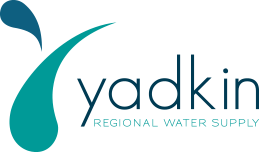Water Treatment Plant
In July 2018, Union County acquired property for a new water treatment plant. Once completed, the water treatment plant will be capable of providing 12 million gallons of clean water per day to thousands of customers in Union County’s Yadkin River Basin service area when it begins to operate.
Where will the plant be located?
The plant will be located on New Salem Road in Monroe, NC. This location was chosen because it meets all of the following criteria:
- Close to the center of customer demand
- Near Union County’s existing water distribution pipelines
- Has a sufficient power supply for water treatment
- Adjacent to major roads
- Enough acreage for long-term expansion
- Appropriate topography
- Low environmental impact
What kind of a neighbor will the water treatment plant be?
The water treatment plant will be a low-impact neighbor. Landscaping will be used to screen its buildings and equipment from view, and low-intensity lighting will be used on the grounds at night.
Will the treatment plant be loud?
The plant’s water pumps may cycle on and off through the day and night, but sound from the facility will be within the requirements set by local ordinance.
What treatment process will the plant use? Will there be an odor?
The plant will use a conventional water treatment process that includes four steps – flocculation, sedimentation, filtration and disinfection. All of these processes are typically odorless.
Flocculation begins by adding a mixture of common treatment chemicals to incoming water. These chemicals are approved by the EPA and the National Science Foundation for use in drinking water. The mixture encourages small suspended particles to bunch together into larger, heavier “floc.” During sedimentation, the “flocs” slowly settle out, clarifying the water. Next, the water passes through granular activated carbon filters, which trap chemical contaminants and remove fine-grained particles. Finally, the purified water is disinfected with sodium hypochlorite and stabilized with ammonia to prevent bacterial growth as it travels through the distribution system to customers’ taps.
